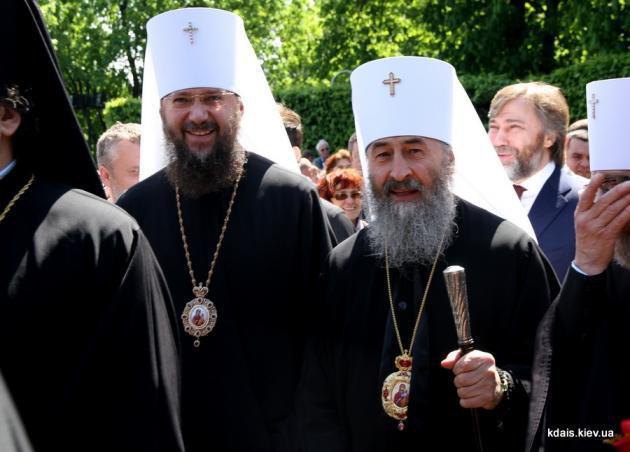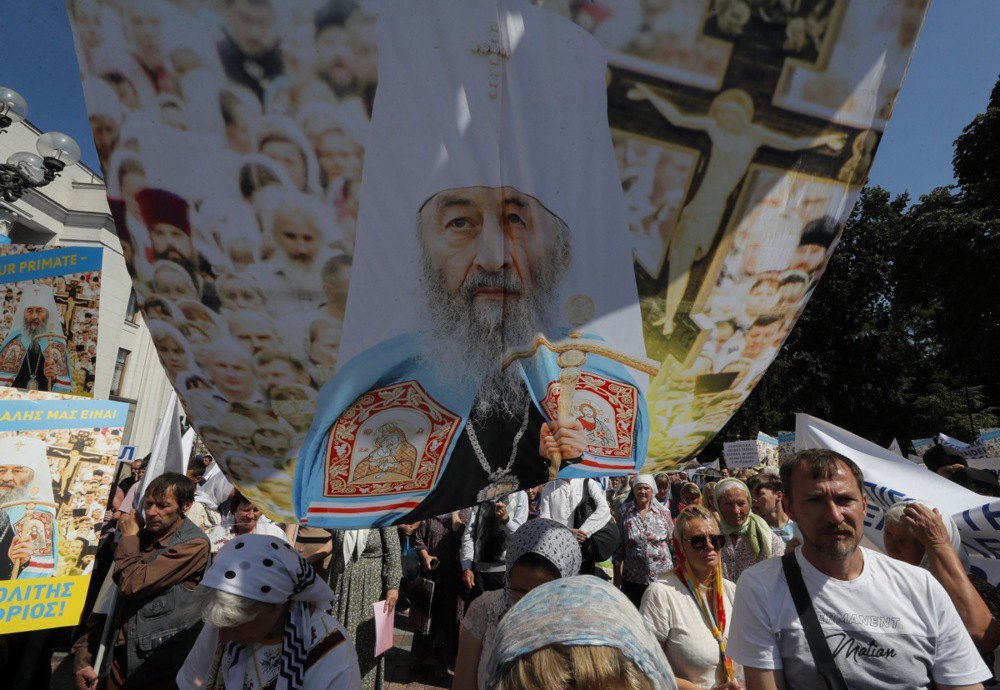
To begin with, the fact that the head of the so-called “Ukrainian Church” holds a Russian passport has been public knowledge for over two years, thanks to investigative journalism. Those familiar with the matter were aware of it even earlier. In fact, Bishop Onufriy never denied it. In a statement released by the UOC-MP in 2023 – and swiftly removed from its official website – he spoke in detail about his lifelong dream: to conclude his earthly journey at the Trinity Lavra of St. Sergius near Moscow. According to him, the “collapse of the CIS” thwarted this aspiration. He admitted to holding a Russian passport, though claimed he had never been “interested” in it and that he “considers himself a citizen of Ukraine.”
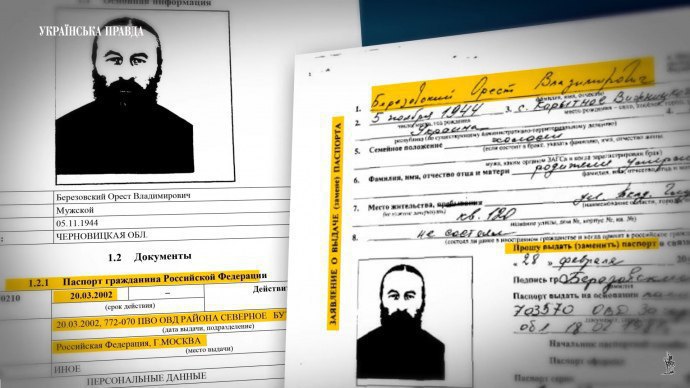
This statement is quite remarkable. In it, the head of the “Ukrainian Church” (!) offers a step-by-step account:
– how he felt mistreated in Ukraine during his youth, which drove him to pursue religious education in Russia. “I secretly went to Russia, to the city of Zagorsk, where the famous Trinity-Sergius Lavra was located, along with the Moscow Theological Academy and Seminary. There, I was not rejected, as I had been in Ukraine, but was enrolled in the second class of the Moscow Theological Seminary”;
– how warmly he was received at the monastery. “Our monastery was international. People of different nationalities lived there: Russians, Ukrainians, Belarusians, Moldovans, Georgians, Armenians, Jews, French, Tatars, Mordvins and many others. We had a wonderful spiritual family – we respected each other, cared for each other and helped each other”;
– how sorrowful he was when he had to return to Ukraine. “I, a sinner, lived in the Trinity-Sergius Lavra for 18 years, where I took monastic vows, was born into a new life in Christ, and touched living holiness – those people who were the embodiment of divine humility and love. I wanted to end my life among such people of God, and citizenship gave me the opportunity to fulfil this dream. Unfortunately, the poor relations between Russia and Ukraine, the collapse of the CIS, and especially Russia’s war against Ukraine destroyed my hope, and now I do not consider myself a citizen of any country other than my native land, Ukraine…”
I have deliberately quoted these extensive passages so that readers do not assume they are an invention. Such a narrative would indeed be difficult to fabricate. At the same time, the statement provides a revealing glimpse into the worldview of Metropolitan Onufriy (Berezovskyy), a figure shaped within the Russian Church – with all the implications that entails. He is now 80 years old, and at that age, a person’s convictions are unlikely to change.
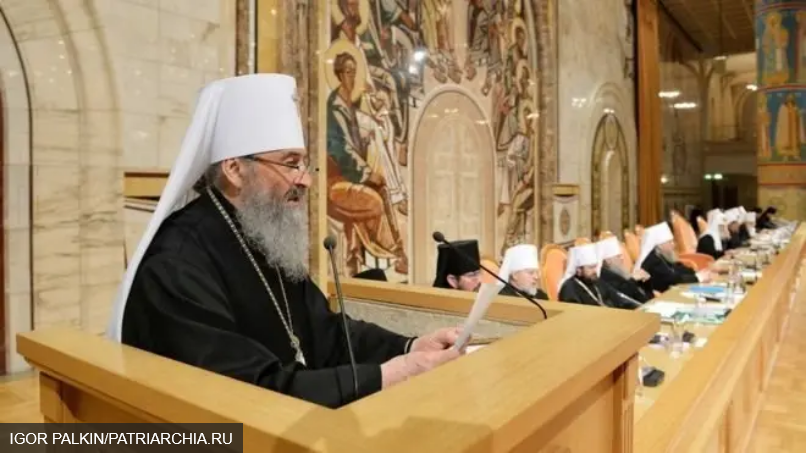
This raises a logical question: if everyone knew, why was citizenship only revoked now?
The answer is evident. May marked the end of the nine-month period granted to the UOC-MP under a law adopted by parliament last autumn, which required it to completely sever ties with the Russian Orthodox Church (ROC). Predictably, the UOC-MP did not comply. Moreover, at the end of May – on the anniversary of the so-called council in Feofaniya (27 May 2022) — Metropolitan Onufriy issued a defiant statement: “What do you want from us? Leave us alone, we have already done everything, the godless authorities are simply persecuting true believers.”
Naturally, this is not accurate. While the council in Feofaniya did result in the removal of all references to the ROC from the UOC-MP’s statute, this measure alone is insufficient. The primates of the local Orthodox churches have not received any official communication from the UOC-MP announcing its separation from the ROC. Furthermore, Metropolitans Onufriy and Anthony (Pakanych – the right hand of the UOC-MP’s head) remain members of the Holy Synod of the ROC.
It is also worth noting that the UOC-MP has made no public response to the ROC’s seizure of its dioceses, or to the exposure of collaborationist activities by members of its clergy. Meanwhile, the ROC – through Patriarch Kirill – continues to denounce the so-called “persecution of believers in Ukraine” on international platforms. Notably, the demand to “leave the UOC-MP alone” is even included in Russia’s own “memorandum” on ending the war (see paragraph 11).
Most significantly, according to the norms of canon law – the system of ecclesiastical rules to which all of world Orthodoxy adheres (in effect, a global Orthodox constitution – S.K.) – the UOC-MP was and remains a structural part of the ROC. This is supported, in particular, by the expert conclusion of the State Service of Ukraine for Ethnic Policy and Freedom of Conscience, which served as the foundation for the law adopted last autumn.
What happens next if the law remains unenforced after nine months? The state initiates an investigation and takes the matter to court. This specifically concerns the Kyiv Metropolis, led by Metropolitan Onufriy. The process is already under way, though the courts are moving slowly. Still, the justified termination of Metropolitan Onufriy’s Ukrainian citizenship constitutes an entirely proportionate and appropriate response.
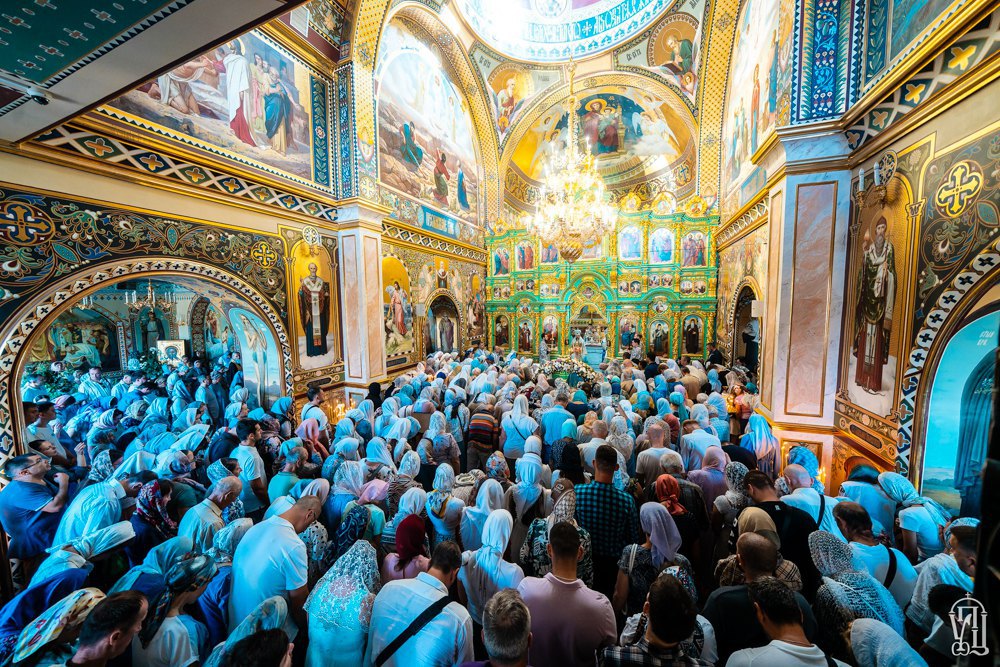
Thus, the answer to the question – why now? – becomes clear.
***
Secondly, what are the practical consequences of this decision for Onufriy personally?
As of now, his legal status is that of a foreign national residing in Ukraine. This means he is required to obtain registration, a residence permit, a work permit, and other relevant documentation. The work permit is particularly important, as according to the UOC-MP’s own statute, only a citizen of Ukraine may lead the Church.
In total, 90 days – that is the maximum duration any foreigner may remain in Ukraine without regularising their legal status. Once this period expires, and if the necessary documentation is not obtained, the individual becomes subject to deportation.
Lawyers representing the Metropolitan – the Ukrainian Orthodox Church of the Moscow Patriarchate has already announced his intention to appeal in court – will undoubtedly argue that he was born in Ukraine. Therefore, they claim, he automatically obtained the right to Ukrainian citizenship following the collapse of the Soviet Union.
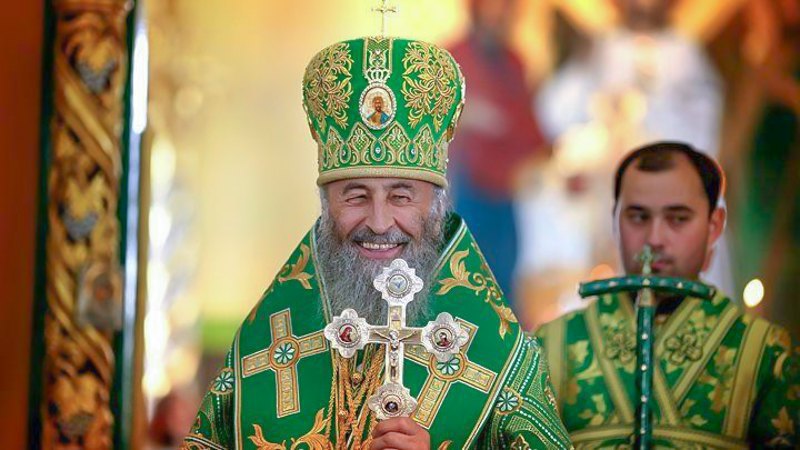
This is where legal complications arise. The fact that the matter will be examined in court has no effect on the 90-day limit – it cannot be suspended. Consequently, there are no legal barriers to deportation. It is worth noting, however, that deportation is a right of the state, not an obligation. In theory, if the UOC-MP were suddenly to change its position, the state might revise, delay, or even disregard the deportation process. The court, too, could potentially “discover” some “previously unknown circumstances” or similar grounds.
How likely is such a development?
Minimal – one might even say negligible.
If the UOC-MP has not previously pursued a full break with the ROC, it is highly unlikely to do so now. On the contrary, it appears to be capitalising on its portrayal as a community of “martyrs”, appealing both to radical believers within Ukraine and to external allies – notably Russian lobbyists and certain American politicians who oppose continued military assistance to Ukraine (less aid equates to a greater chance of success for the so-called “Russian world”).
That said, the question of deportation also raises uncertainties. Let us recall that under President Petro Poroshenko, Mikheil Saakashvili – at that time stateless – was deported to Poland, as it was the last country from which he had entered Ukraine. Savik Shuster, meanwhile, was simply stripped of his right to work. The process began back in 2017 with Andriy Artemenko, a then-member of parliament who held a Canadian passport, for those who may not remember.
Onufriy, as noted earlier, was born in Bukovyna. And although Ukrainian law is not based on precedent, and property or residency rights do not derive from birthplace alone, it remains unclear how precisely the state should proceed. The most straightforward option might be to escort him to the border with Belarus – a country engaged in a union state with Russia – and leave the matter to their discretion. However, the potential legal risks must be carefully assessed, including those associated with future proceedings in international courts.
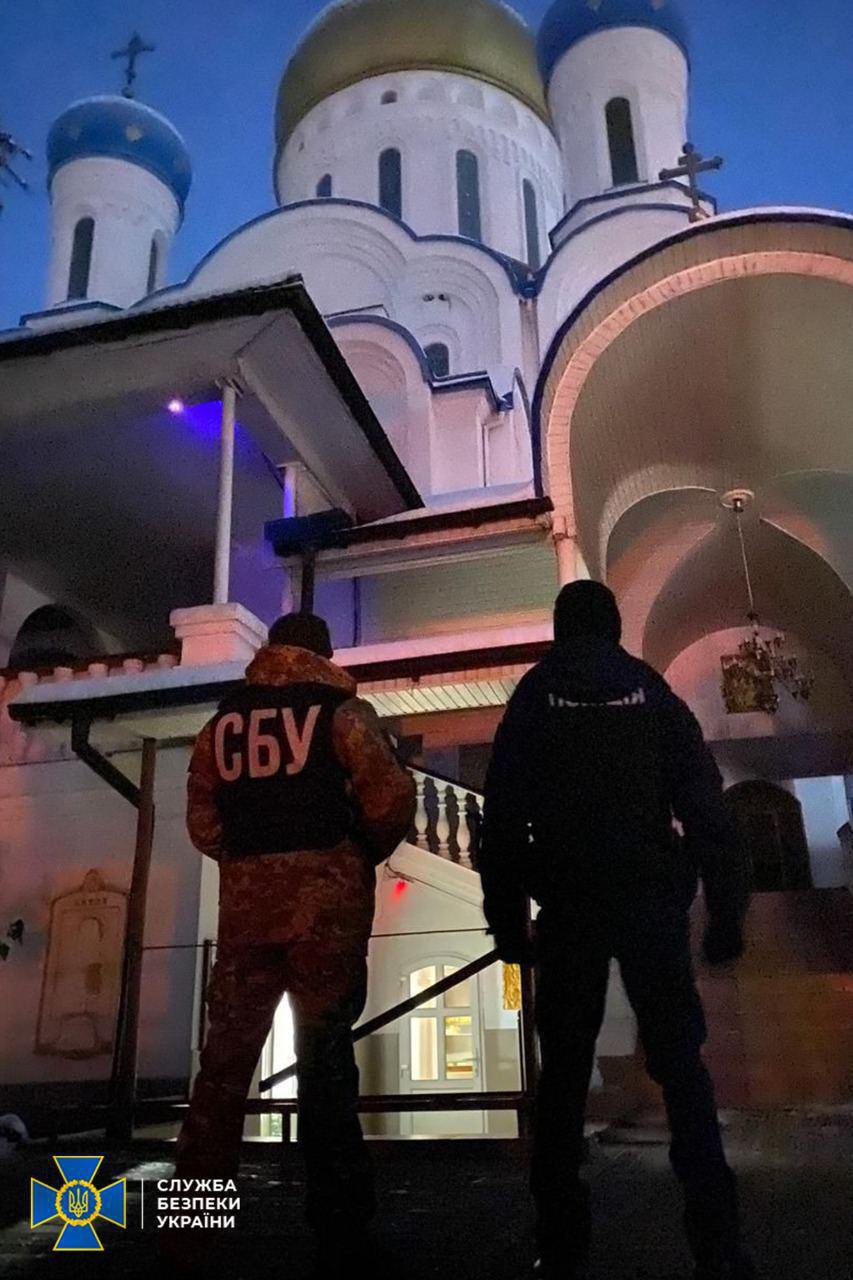
Third. What consequences will this have for the UOC-MP?
Let us refer to the most recent update to the organisation’s charter.
“In the event of the death of the Metropolitan of Kyiv and All Ukraine, his retirement, his being under ecclesiastical court or other reasons that make it impossible for him to perform his duties as Primate of the Ukrainian Orthodox Church, the Holy Synod, chaired by its senior member in terms of episcopal consecration, shall immediately elect by secret ballot from among its permanent members a Locum Tenens of the Kyiv Metropolitan See, who shall assume temporary control of the Kyiv Diocese.”
And further: “Until the election of a new Metropolitan of Kyiv and All Ukraine, the Ukrainian Orthodox Church shall be governed by the Holy Synod, chaired by the Locum Tenens.”
The election itself must take place “no later than three months.”
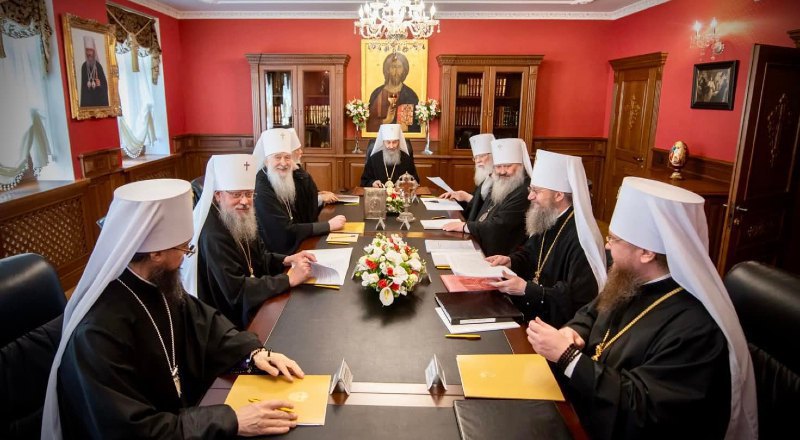
In layman’s terms, the Synod of the Ukrainian Orthodox Church of the Moscow Patriarchate functions like a combined parliament and government, comprising the most senior and respected bishops. The eldest among them convenes the assembly, they elect an acting head, and then proceed to hold elections.
The current “elder” is the head of the Dnipropetrovsk diocese, Metropolitan Irenaeus (Seredniy). Who… also holds a Russian passport.
What can we expect if Metropolitan Onufriy is in fact deported? Will the Synod of the UOC-MP invoke the clause concerning “other reasons that make it impossible to perform the duties” of the Church’s head? Or will it opt to ignore the situation and continue governing synodically? The latter seems the obvious course.
Indeed, a similar precedent has already occurred. When Metropolitan Ionafan (Yeletskyh) – a close friend of Patriarch Kirill and recipient of an award “for loyalty to the Russian Orthodox Church” (literally) – was transferred to a marginal position in exchange for his collaboration and public glorification of the aggressor, the UOC-MP issued no formal response whatsoever. Ionafan’s protégé, Bishop Sergius (Anitsa), simply assumed administrative control of the diocese. Who – it bears mentioning – also possesses a Russian passport. At present, nearly two dozen top-ranking clergy of the UOC-MP hold such documents, while the number of ordinary priests in the same category is no longer even tracked.
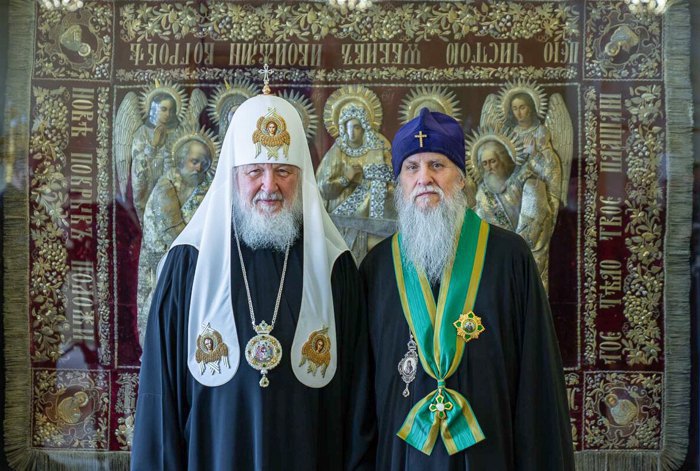
But let us return to the broader prospects of the Church. Not the first in rank, but certainly not the second either, the most influential pro-Russian “hawk” within the UOC-MP remains Metropolitan Anthony (Pakanych). By now, you will not be surprised to learn that he, too, belongs to the “club” of those holding particular foreign documents, let us call it that.
Many are now asking: if Onufriy’s citizenship has been terminated, why have no similar measures been taken against Pakanych, who has been under sanctions for more than two years? Why this selectivity?
To use the language of modern politics, the Ukrainian state is leaving itself room to manoeuvre – keeping cards in reserve. If the UOC-MP fails to reconsider its stance even after such a blow as the removal of Metropolitan Onufriy, the next target will almost certainly be Metropolitan Anthony. In April, he was searched in connection with a criminal case involving the appropriation of church property by a close associate who has already been charged. The procedural status of Pakanych himself remains unknown. – S.K.
And then, the UOC-MP will truly find itself without a leader.
